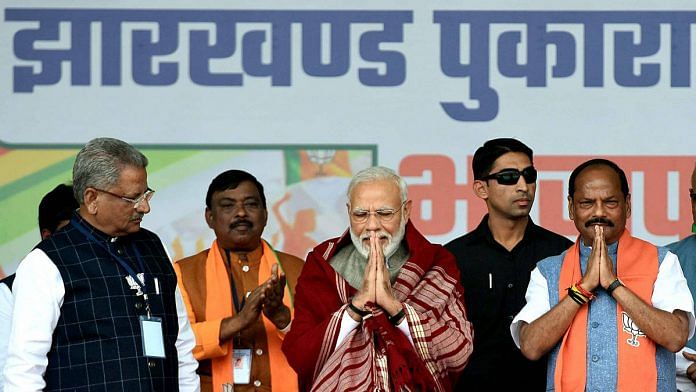New Delhi: The Maharashtra and Haryana assembly elections did not produce the expected results for the BJP, despite being held just five months after its facile victory in the Lok Sabha polls. That’s why the Jharkhand assembly election results, which will be declared today, have assumed extra importance for the party.
The small-but-mineral-rich state could be an indicator of the national mood or, at the very least, will provide clues to the BJP leadership about what tweaks it needs to make to its strategy for state polls.
Here are five reasons why the Jharkhand elections are crucial for the BJP.
Also read: Modi-Shah’s BJP has won state elections on national issues but Jharkhand can be a rude shock
Test of Ayodhya Ram temple and CAA as poll planks
This is the first election since the Supreme Court passed the Ayodhya judgment, awarding the disputed Ram Janmabhoomi-Babri Masjid site to the Hindus for the construction of a Ram temple. The contentious Citizenship (Amendment) Act was also passed in Parliament during the five-phase elections, and Prime Minister Narendra Modi and Union Home Minister and BJP president Amit Shah extensively raised both issues in their election campaigns.
Campaigning in Jharkhand Chief Minister Raghubar Das’ constituency Jamshedpur (East), Modi asked the crowd: “Did the Ram Janmabhoomi dispute happen after we came to power? Wasn’t it the Congress that obstructed a resolution? Was it not done for vote bank politics?”
Modi also linked Lord Ram with tribals, a crucial vote bank in Jharkhand, saying: “Ram left Ayodhya as a prince, but returned as ‘maryada purushottam’ (peerless in terms of proper conduct) later, as he spent time with adivasis in forests and imbibed their culture.”
Meanwhile, at a rally in Pakur, Shah declared that within four months, construction of the “sky-scraping” Ram temple will begin in Ayodhya.
The BJP also used the new citizenship law and the protests against it to polarise the election. PM Modi said at a rally in Dumka: “People who are setting the fire can be seen on TV, they can be identified by clothes they are wearing.”
The party had used a similar strategy in Maharashtra and Haryana too — using the scrapping of Article 370 in Jammu and Kashmir to drum up nationalism and boost its votes. However, the results in those states showed that local factors mattered more to the electorate.
Also read: BJP is dividing Jharkhand tribals on religion, won’t win election: JMM chief Hemant Soren
Amit Shah’s last election as BJP chief
The Jharkhand polls could be Shah’s last as the national president of the BJP, as working president J.P. Nadda is set to take over the running of the party soon.
After a successful run that saw the BJP form governments in a majority of India’s states, the final few months of Shah’s tenure have seen the party slide in one state election after another.
In 2018, the BJP lost Rajasthan, Madhya Pradesh and Chhattisgarh to the Congress, and this year, it has already lost power to a post-poll Shiv Sena-NCP-Congress alliance in Maharashtra.
Although it has hung on to power in Haryana thanks to a post-poll tie-up with Dushyant Chautala’s Jannayak Janata Party, its performance was far below its expectations of 75 seats out of 90, or even pollsters’ projections.
If the BJP now loses power in Jharkhand, it would be another demoralising defeat, ahead of its bid to dislodge Arvind Kejriwal’s AAP in the Delhi assembly polls.
Also read: 3 challenges for Jharkhand CM Raghubar Das — ‘arrogance’, opposition within BJP, and tribals
Are people voting differently in assembly and Lok Sabha elections?
The Maharashtra and Haryana elections reinforced that voters are now distinguishing between national elections and state elections before making their choices.
In Haryana, people voted on the performance of M.L. Khattar’s five-year government, while in Maharashtra, issues like the agrarian crisis, water scarcity and unemployment were factors, even though the pre-poll BJP-Shiv Sena alliance won a majority but broke up due to internal differences on government formation.
In both states, Modi and Shah had campaigned extensively.
Also read: Toilets without doors, incomplete houses — govt schemes in Jharkhand a job half done
Dominant caste-versus-other castes experiment
After winning the 2014 round of elections in the same states, the BJP experimented by installing chief ministers from castes other than the dominant caste — Brahmin Devendra Fadnavis instead of a Maratha leader in Maharashtra, Punjabi Khattar instead of a Jat leader in Haryana, and non-tribal Raghubar Das in Jharkhand.
But these choices backfired on the BJP — Chautala’s debutant JJP won back a ton of Jat votes from the BJP, while in Maharashtra, the Marathas reposed their faith in NCP’s Sharad Pawar, whose alliance with the Shiv Sena pulled the rug from underneath Fadnavis.
The Jharkhand results will show whether the tribals have felt political isolation and want to reassert their strength.
Also read: Tribals vs non-tribals — how the Jharkhand elections are likely to be decided
RSS’ tribal outreach and anti-conversion bill
Jharkhand is considered the RSS’ laboratory for tribal outreach, and the BJP is banking on an anti-conversion act passed by Das’ government in August, the sixth state to put curbs on religious conversion, punishable with a three-year jail term and a fine of Rs 50,000.
Twenty-seven per cent of Jharkhand’s population is tribal, and 4.3 per cent is Christian. Battle-lines have been drawn between the church and the tribals for years, so it will be interesting to note if the BJP and RSS experiments will bear fruit.
Also read: Jharkhand poll battle in Gangs of Wasseypur land is a story of murder, family feud & clout




Those days of Muscical chairs played by BJP and Congress seems to be ending for good.future generation is demanding Result-oriented performers leaders within time frame and problem-solvers leaders of Indians of all communities/castes.you can make out a nice article and advertise in yopur daily so that those who have ears,may hear.